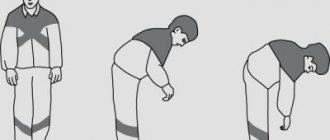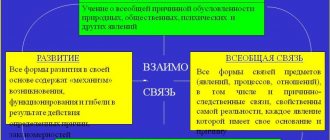Unfortunately, the modern world involves rapid changes in circumstances, stress, busy work schedules, uncertainty about the future, and we are increasingly forced to leave our comfort zone, which means we experience stress. The nervous system is under prolonged, or even constant tension, and it needs to be protected, unloaded, and not brought to a situation where it can fail. This is where abstraction comes to the rescue: thanks to it, in different life situations we can relieve the psyche and solve problems without being influenced by unnecessary emotions.
We often hear this advice: “Try to abstract yourself from this!” Today we will talk about what it means to abstract, why it is needed and how to do it.
Abstraction - what is it?
Abstraction (from Latin abstractio - distraction) is a process expressed in the ability to escape from minor details (stimulants) and concentrate on something more important, more general. In psychology, abstraction is understood as a change in the “angle of view,” i.e., thinking, and not a change in the type of activity.
We need abstraction in order, for example, to decide on a life goal, to set the “general direction” of our life path (and only then decide on small details - for example, what exactly to do in life); to distract yourself - from a boring or unpleasant conversation, from stress, from noise. By abstracting, we distance ourselves from the situation, look at it “from the outside” and get the opportunity to calm down, collect our thoughts, and make the right decision.
The ability to abstract helps us “separate the wheat from the chaff,” that is, by ignoring unnecessary information (for example, discomfort, workload), “disconnecting” from it, identifying the essence of the problem, concentrating on it and deciding on a way to solve it. In everyday life, most often we look for practical ways that tell us how to learn to abstract
- from destructive, depressing thoughts; from people, after communicating with whom you are left with a feeling of emptiness and an unpleasant aftertaste;
- from external irritating noises (sounds, conversations, working mechanisms, stomping from the apartment on the floor above, and so on);
- from being forced to perform boring, familiar tasks that cause unpleasant emotions.
Can skill get in the way?
Of course, any talent has two sides: positive and negative. Abstraction can also be extremely useful or harm a person, so it is important to manage this quality yourself, and not obey it unconsciously.
The dad on duty from the film of the same name forgets about the meeting after discovering a drawing of his little son in the papers. As a result, he decides to give up a solid salary and a high position in favor of his own kindergarten. The denouement corresponds to the theme of the plot, but in the end the hero loses a good career...
Uncontrolled abstraction is quite capable of causing a tragedy: by involuntarily succumbing to it, you can get hit by a car or cause an accident yourself, find yourself in an awkward situation, etc. Therefore, along with the need to have this quality, it is important to have the ability to manage it.
What useful things can you see by abstracting yourself?
Perhaps you will notice that, out of habit, you lose control over your emotions when something goes “not according to plan,” that is, when the situation changes (after all, at the same time you feel that you have left your “comfort zone”, and this is natural for you somewhat unbalanced).
- Think: maybe this habit is not so good, and has interfered with your life more than once, and it’s time to slowly part with it?
- Perhaps you do not know all the circumstances, and the changed alignment is actually either only for your benefit, or protects you from even greater troubles.
- Perhaps you can turn new circumstances to your advantage?
- Think: yes, circumstances have changed, but are you not paying too much attention and effort to this, are you exaggerating the importance, are you making a mountain out of a molehill?
By using abstraction, you will weigh different options and not only solve the problem, but also save a lot of energy that we usually lose by splashing out emotions.
In the dictionary Complete accentuated paradigm according to A. A. Zaliznya
abstract, abstract, abstract, abstract, abstract, abstract, abstract, abstract, abstract, abstract, abstract, abstract, abstract, abstract rush, abstracting, abstracting, abstracting, abstracting, abstracting, abstracting, abstracting, abstracting, abstracting, abstracting, abstracting, abstracting, abstracting, abstracting, abstracting, abstracting, abstracting, abstracting, abstracting, abstracting, abstracting, abstracting, abstracting, abstracting, abstracting abstracted, abstracted, abstracted, abstracted, abstracted, abstracted, abstracted, abstracted, abstracted, abstracted, abstracted, abstracted, abstracted, abstracted, abstracted, abstracted, abstracted, abstracted, abstracted, abstracted, abstracted, abstracted, abstracted, abstracted, abstracted, abstracted abstracted, abstracted, abstracted, abstracted, abstracted, abstracted, abstracted, abstracted, abstracted
How to learn to abstract?
For example, let's look at several possible options:
1. How to learn to abstract yourself if you are in a difficult, unpleasant situation that requires making a decision?
Look at the situation from the outside. You have probably noticed that after the fact of an unpleasant situation for you, having pulled yourself together and looking at what is happening from the outside, you clearly see what you should have said, how to respond and where to remain silent: when emotions leave you, you abstract and can become observer. The task is to learn to abstract yourself during the conversation.
If you are overwhelmed by emotions, the best thing you can do is to free yourself from their power. Abstract yourself, look at the situation from the outside. How to do it? Inhale deeply and exhale slowly several times. Imagine that you are observing the situation from the outside, that you are not a participant in the scene, but a spectator who is absolutely not affected by what is happening. This viewer does not experience your emotions and knows something of his own, and not what you know. This is a complete stranger. Look at the situation through his eyes, “ask” him what he thinks and how he evaluates what is happening, what he sees as the reason that prevents everything from being resolved. The answer will come by itself.
Alternatively, treat what is happening as if you are both an actor and a director, and what is happening does not affect you personally, it is just a game, and what happens next is up to you. Calmly look at what is happening from the outside and think about what you can say or do now, what the other participant (or other participants) in this game is feeling, and how best to get out of this situation. This is abstraction. “By leaving the situation,” you will have the opportunity to look at what is happening objectively, impartially, and calmly. This will help you make the right decision.
2. How to abstract yourself from noises and sounds?
We are constantly surrounded by sounds. Moreover, finding ourselves in an environment where there is no sound, a person begins to get nervous: complete silence stresses us out, it prevents us from relaxing. Thus, being in a chamber isolated from sounds forces us to focus on our heartbeats, our breathing, and our randomly racing thoughts. It turns out that a person needs external sounds and noises. There are studies by scientists at the University of Illinois proving that average sound background (60 dB) helps to increase creativity.
The sounds of nature are beneficial for us: the brain recognizes separately different acoustic signals coming from the outside, and, if desired, can highlight each of the sounds, “read” this information, process it, so it “recognizes” these sounds as melodic and natural. In the city, all sounds merge into one noisy background, unpleasant for many. It has been noticed that if sounds are unpleasant to a person, they can provoke insomnia, hearing loss, cause anxiety, lead to an increase in the production of cortisol in response to stress, and therefore to an increase in blood pressure. So, we need a background noise, but the sounds should not be annoying. And here the ability to abstract can come to the rescue.
3. How to learn to abstract yourself if you are on the verge of a breakdown? Believe me, in this case it is better to simply postpone your work. Are emotions getting in the way? Then let's abstract it: will the sky fall to earth if you put off work for a while? For example, take a nap or even sleep, meditate, “switch” with the help of good music for 30 minutes? During relaxation and a favorite activity, our brain will calmly process information, organize it and take a break from emotions. You will get the break you need and avoid emotional overload. The result will be much better, believe me.
4. How to learn to abstract yourself if you are haunted by concerns and fears? Throw away your emotions, “look fear in the eyes,” try to identify its true causes and eliminate them, and if there are no reasons, then your fears will dissipate as groundless.
5.To abstract yourself from the negative, remember that, by and large, what happened was not a disaster; you should not exaggerate. Simplify the situation to the maximum: a quarrel is just a disagreement, which can strengthen the relationship, because it will help to talk about the problem and better understand each other; getting fired is not a disaster: perhaps it will be even better, because you will find a job that you will enjoy doing. Money is also a matter of gain. Instead of being sad, it’s better to think about how to earn them. A sense of humor helps a lot in abstracting from the negative - this way we simplify the situation, look at it from the outside and relieve tension with the help of laughter.
However, first, let's look at how to avoid irritability.
Abstract and concrete
In dialectical logic, the concept of “abstract” is contrasted with the concrete, for example, concrete thinking is abstract thinking (see Ascent from the abstract to the concrete). In dialectical logic, the concept of abstraction is often used in a negative sense: as something one-sided, undeveloped, too detached from life, in contrast to the concrete.
Abstract thinking involves operating with abstractions (“man in general”, “the number three”, “tree”, etc.), concrete thinking deals with specific objects and processes (“Socrates”, “three bananas”, “oak tree in the yard” ", etc.). The ability for abstract thinking is one of the distinctive features of a person, which was probably formed simultaneously with language skills and largely thanks to language (for example, it would be impossible to even mentally operate with the “number three” in general without having a specific linguistic sign for it - “three ”, since in the world around us such an abstract, unattached concept simply does not exist: it is always “three people”, “three trees”, “three bananas”, etc.).
What will help you avoid irritability?
As always, we have tips for this case too:
- Use habits that help you structure and organize your thoughts, knowledge, and tasks. These are tables, diagrams, plans, distribution of tasks by level of importance, reminders, notes. When you have a plan, a vision of the situation and prospects, you will feel calmer, begin to manage your life, and stop feeling like a piece of wood carried by the current.
- Get enough sleep and don’t starve yourself: lack of sleep, fatigue, hunger lead to depletion of vital resources and signal that it’s time to start properly distributing rest and workload, planning your activities and getting enough sleep. You can’t get by with stimulants, pills and complaints: if you don’t take care of your health, then naturally everything and everyone will irritate you, and it will become difficult to abstract yourself. Think about what gives you a “reboot”, complete rest and relaxation. This could be sleep, meditation, yoga, massage; This could be time spent on the shore of a pond, a bike ride, swimming or other methods, you just need to think about what suits you personally.
- Replace extraneous noises with those that calm you down: for example, unobtrusive, quiet melodic music that you love. If you want “just silence,” use earplugs.
- Breathing exercises, slow, full breathing calm you down, help you cope with anxiety, enrich you with oxygen, and improve brain function. For example, use this breathing technique: take a slow, deep breath, counting to four. Hold your breath and count to eight. Form your lips into a tube, as if you were whistling, and exhale, also counting to eight. Repeat several times.
- Use anti-stress toys. When we stroke, squeeze, roll, rotate, fold something in our hands, it helps relieve internal tension and focus. You just need to choose “your” toy that helps you to abstract yourself: a rosary, a spinner, a rollspin or something else that you enjoy holding in your hands, that distracts you from emotions, relaxes and calms you down.
- Abstract with the help of your imagination if noise from outside interferes with your rest. Imagine yourself in a place where you feel calm and protected. Maybe on a shady lawn with the chirping of grasshoppers, or in a hammock in the country, or on the edge of a forest, or on sea pebbles. Imagine what you see and hear - a few minutes will be enough to “reboot”. By thinking about a pleasant place and imagining it, even for a short time, we suppress negative reactions of consciousness.
- How to learn to abstract if the imagination “does not want to turn on”? Then try to briefly focus on the sound that annoys you and interferes with your work, “accept” it and focus on the task you were doing. Consider it a workout. Gradually you will learn to be distracted from external stimuli, to “disconnect” from them. The main thing is to turn off the “this annoys me” mode.
Abstraction in psychology
In psychology, abstraction is considered not only the result of the abstraction process, but also the consideration of an object (or person, situation, etc.), paying attention only to the main characteristics, ignoring trifles or insignificant features. Abstraction helps during the process of generalization or concept creation
Types of abstraction in psychology
Jean Piaget (Swiss psychologist and philosopher) in his books divides abstraction in psychology into three main types.
Piaget divided abstraction into empirical (focusing on the objects themselves and their properties) and pseudo-empirical (focusing on actions aimed at objects and the properties of these actions). After this, reflective abstraction occurs: thinking about these ideas
Thus, the thought process itself becomes a new subject for reflection (Piaget, 1972, p. 70)
After this, reflective abstraction occurs: thinking about these ideas. Thus, the thought process itself becomes a new subject for reflection (Piaget, 1972, p. 70).
How to deal with negative emotions?
It's time to talk about negative emotions - the main obstacle that affects all areas of our lives. We advise you to pay attention to some points:
- In life, not everything can go smoothly, and events do not always easily develop according to our plan. There must be a plan, but you need to understand that life always has its adjustments in everything. According to legend, the inscription was carved on the ring of the wise King Solomon: “Everything passes. This too shall pass.” Accept life as it is, avoid excessive euphoria in moments of joy and do not fall into deep despair in moments of sadness. We cannot control everything around us, but we can understand this and learn to treat life as a source of wisdom, joy and feasible hardships, as a path to self-improvement.
- We all make mistakes, we all learn, we all lose our tempers at times, we are not perfect. Do not rush to judge others or yourself. It’s just that we are all different, and the circumstances are different, and we never fully know other people’s circumstances, just as those around us never know ours. Therefore, the main thing is not to take someone else’s or your own failure or mistake to heart. This will allow you to avoid a lot of suffering and mistakes. Be simpler, take things easier: anger is a bad advisor.
- Learn from mistakes, but don't let criticism or self-criticism ruin your life. Mistakes are necessary, thanks to them we gain invaluable experience, learn and improve. But it’s not just us, everyone has the right to make mistakes. Therefore, treat mistakes philosophically, with understanding, extracting rational grains of benefit from each and abstracting from the negative emotions associated with them.
- Nothing energizes you more than the ability to enjoy the current moment. We feel, think, breathe, we are healthy (or at least relatively healthy), we have those who are dear to us, we live: we feel, touch, hear, see, we are able to think, invent, enjoy even the simplest things – you just need to sometimes “stop” in the current calm moment in order to feel it and feel the joy of what you have. Everything is learned by comparison, and you yourself can give many examples confirming that everything is not so bad for you personally.
- Perhaps the only thing left to say is a positive attitude. By becoming more positive, kinder, more compassionate, calmer, you will “attract” positivity, kindness and mercy into your life. Perhaps new faces will appear in your life, communication with whom will bring you more joy. Well, let’s abstract ourselves from the toxic environment! Abstracting from the bad means learning to concentrate on the good, not allowing ourselves to be drawn into an emotional “storm” in which we predictably lose strength. Instead, we will switch to other topics, other thoughts, and use our imagination.
Well, it's time to sum up. Abstraction will help you solve inevitable problems without unnecessary emotions, thanks to an unbiased view from the outside, which means that thanks to it you get a valuable opportunity to benefit from your mistakes. Everyone makes mistakes, but few people know how to learn from mistakes and move on with gratitude for the fact that they now know more and understand more deeply. Difficulties can become new goals for you, and mistakes can become tips (what you can improve on, what to pay attention to). Knowing how to learn to abstract yourself, you can become the master of your emotions, the director of many situations, and simplify the process of solving current problems.
When we are focused on something, such as a game, we also learn to abstract ourselves from the outside world.
To ensure that your attention and memory, thinking and perception - the cognitive functions of your brain - are maintained and improved, you can successfully practice classes using effective and fun online brain exercises. Try it now!
We wish you success in self-development!
Abstract and concrete
These are classifications that indicate whether the item being discussed has physical characteristics. Concrete objects have physical characteristics (they can be touched, weighed, bought and sold), but abstract objects do not.
An abstract subject is one that does not exist in any specific time or place, it is an idea or abstraction. This classification, abstract and concrete, is often used in philosophy. Abstract objects are sometimes called abstract, and concrete objects are sometimes called concrete.
An example of the abstract can be friendship, philosophy, peace. And a concrete example is the philosopher Plato, a tree, the planet Earth.
Life without panic attacks and VSD. 5 tips for prevention
Alas, medicine does not know exactly why panic attacks occur, so the ways to combat them are rather general recommendations, which, however, will help you avoid attacks in the future.
- Don't lead a sedentary lifestyle. There is a scientific assumption that the occurrence of attacks is associated with a lack of endorphins, which our body produces during physical activity. Therefore, even light aerobic training and walking can make your life much easier.
- Try not to be nervous. Yes, we know that this recommendation sounds ridiculous - how can you not be nervous when life is so difficult? But, alas, calmness and only calmness will save you from panic attacks and other ailments.
- Don't drink coffee or reduce your intake. Caffeine in large quantities causes a rapid heartbeat and can trigger a panic attack at the most unexpected moment.
- Be careful with alcohol. Alcoholic drinks, like any pathogen, can cause unexpected reactions in the body, including causing an attack.
- Also be careful with medications. Analyze whether a panic attack is associated with taking a new drug? Sometimes medications can trigger panic attacks, so check with your doctor.
Forms of abstract thinking
The main forms of abstract thinking are:
- Concepts. They reflect the general and distinctive features of an object or phenomenon. They can describe it externally or reflect internal properties, be obvious or not immediately noticeable. Concepts describe the essential features of an object, the change of which leads to the cessation of its existence. They may consist of one or more words. For example, this is a table, a person, a group of students, a knitted scarf;
- Judgments. Thanks to them, a connection is formed between concepts. They deny or confirm the presence of signs in objects, the relationship between them. Judgments carry truth or contain lies. In the phrase “Maria Petrovna is a school teacher,” a sign is defined for the subject. The proposition “Marina is our neighbor’s daughter” establishes a connection. Negation is created by using the particle "not". So a statement can be turned into a negative judgment and vice versa;
- Conclusions. They allow one judgment to be transformed into another through reasoning. Originally existing facts are called premises. Judgments that appear as a result of the work of thought are conclusions. Reasoning must follow logic. It may be that you have to follow not an inviolable rule or law, but an assumption. The transition from premises to conclusions is a conclusion. For example, there are two propositions, “The garden is harvested in the fall” and “The apples will ripen when the summer ends.” After analyzing the facts, we can come to the conclusion that “Apples need to be picked in the fall.”
Categories are used not only in psychology, but are also used in philosophy and exact sciences
Abstract thinking is given attention in management; it can improve the climate in the team
Types of abstraction
Some types of abstraction:
primitive sensory abstraction - distracts from some properties of an object or phenomenon, highlighting its other properties or qualities (emphasizing the shape of an object, abstracting from its color or vice versa). Due to the infinite variety of reality, no perception is able to cover all its sides, therefore primitive sensory abstraction occurs in every process of perception and is inevitably associated with it.
generalizing abstraction - gives a generalized picture of a phenomenon, abstracted from particular deviations. As a result of such abstraction, the general property of the objects or phenomena under study is highlighted. This type of abstraction is considered fundamental in mathematics and mathematical logic.
idealization - replacement of a real empirical phenomenon with an idealized scheme, abstracted from real attributes that are unimportant for a given study
As a result, the concepts of idealized (ideal) objects (“ideal gas”, “absolute black body”, “straight line”, etc.) are formed.
isolating abstraction - is closely related to involuntary attention, since in this case the content on which attention is focused is highlighted.
abstraction of actual infinity is an abstraction from the fundamental impossibility of fixing every element of an infinite set, that is, infinite sets are considered as finite.
constructivization is a distraction from the uncertainty of the boundaries of real objects, their “coarsening”.
By purpose:
- formal abstraction
is the identification of properties of an object that do not exist in themselves and independently of it (shape or color). This type of abstraction serves as the basis for children to acquire knowledge that describes objects by their external properties, which serves as a prerequisite for theoretical thinking. - meaningful abstraction
- the isolation of those properties of an object that themselves have relative independence (a cell of an organism). This type of abstraction develops students' ability to operate with them.
Work on yourself
If you do not want to communicate with a person, then the first and easiest solution is to simply stop all communication with him. Stop seeing each other, stop calling each other, delete each other from all social networks and never cross paths again.
Let's start with the fact that sometimes you can try to solve the problem. For example, your friend is annoying you. Every time you meet, it’s terribly annoying that she’s late. Instead of constantly accumulating negativity and silently tolerating her behavior, you can calmly talk. Express your dissatisfaction. Explain your position and listen to her.
Perhaps just such a heart-to-heart conversation will solve your problem and you will no longer encounter it. In the article “If Friends Don't Respect You,” I give a lot of useful advice on how you can solve a problem with a loved one.
If a heart-to-heart conversation does not help or cannot take place for other reasons, for example, you cannot have a heart-to-heart talk with your boss or an annoying colleague, then you have other options to try to abstract yourself from the problem.
Don't let the other person make you angry
An emotional reaction shows that we cannot assess the situation objectively. Emotions can take over you for just a couple of seconds, or they can completely take control of your behavior. If a person radiating negativity manages to make you angry or unbalanced, this means that you were unable to maintain a sober view of the situation.
When you encounter negative behavior that hurts you, don't respond to insult with insult. Maintain your dignity and do not stoop to the level of your interlocutor. Try to get to the root.
The Lifehacker Telegram channel contains only the best texts about technology, relationships, sports, cinema and much more. Subscribe!
Our Pinterest contains only the best texts about relationships, sports, cinema, health and much more. Subscribe!
Determine the main thing
The algorithm, however, does not end there. Each of the components of the overall complex problem requires its own solution, which should be sought abstractly. Temporarily you need to ignore all circumstances that are not related to a narrowly defined issue, or abstract yourself. This skill allows the human mind to make scientific discoveries, create immortal works of art and solve the most complex technical problems.
A scientist, an engineer, and a poet should be able to distinguish the wheat from the chaff, the essential from the insignificant, the important from the unnecessary.
But what is the situation like in the everyday life of ordinary people? The ability to abstract, that is, to be distracted from everything unimportant, is very important for every person. According to the poet, our planet is poorly equipped for pleasure
All the time, some circumstances interfere with either working or resting. Achieving ideal conditions for both is extremely difficult, if not impossible. There is only one thing left to do - abstract. This means that if undesirable circumstances arise that interfere with life, and it is impossible to eliminate them, they must be ignored.
In this case, of course, the effect of interference should be minimized by all possible means. For example, to get rid of noise, it is not enough to simply ignore it (not everyone can do this). But you can plug your ears with cotton wool.
Learn to understand other people through yourself
First, learn to understand yourself. Why do you get irritated when you see this person? Maybe you yourself would like to be as rich as he is and this is just a feeling of envy in you? Most often, we are irritated in those around us precisely by those moments that resonate most strongly in ourselves.
It really annoys my friend when girls wear too much makeup. For a long time I could not understand the reason. The girl is wearing bright and provocative makeup, what's wrong with that? But one day it turned out that as a child, my friend’s mother forbade her to use cosmetics at all and now she only uses mascara. After a long conversation, it turned out that she sometimes really wants to put on bright makeup, but the inner feeling of prohibition from her mother will not let her go.
Therefore, it is very important to understand what exactly irritates you in other people and why you experience certain emotions. Once you understand yourself, it will become much easier for you to respond to the people around you.
Second point, if you meet arrogant, hypocritical, rude people, then you should try to put yourself in their place. Understand that they are not evil, this is how circumstances have developed, they may now be going through a very difficult period in their lives and this is how they throw out their emotions.
Development of abstract thinking
In this block we want to briefly talk about how to develop abstract thinking in children and adults. Considering that the methods of its development in these cases will differ, we will talk about them separately.
Development of abstract thinking in children
Despite the fact that abstract thinking develops automatically in a child, parents can create special conditions to improve this process. It is recommended to start classes from the first years of life, when the child's brain is formed and growing. The main task is to help the child move from operations with specific objects to working with abstract concepts, as well as broaden his horizons as much as possible.
Here are some suitable exercises for this:
- Take a landscape sheet and spill a little gouache or ink on it to make a blot. Together with your child, you need to make some kind of drawing from this blot, for example, a cheerful face or a funny little man.
- Come up with unusual titles and names together with your child. You can pick up an image on the Internet and come up with at least three interesting names for it. Unusual names can be made for animals and even people.
- Put on small theater productions with your child. Create costumes and other props from scrap materials. Abstract thinking in children is excellently developed by shadow theater games.
Along with these exercises, solve puzzles, rebuses, riddles and anagrams with your child. Play logic games and chess, collect puzzles and make associations. Initially, the baby may have difficulty completing tasks, but very soon his abstract thinking will develop very quickly, much faster than that of an adult.
Development of abstract thinking in adults
Developing abstract logical thinking in an adult is a little more difficult than in a child. The fact is that the thinking of an adult has already been formed and has become less flexible. New knowledge is more difficult to perceive and assimilate. But this is not a hindrance if you perform special exercises to develop creativity and the ability to think in abstract categories:
- Close your eyes and imagine as vividly as possible everyone you interacted with during the day. Do this in every detail: remember clothes, timbre and volume of voice, gestures, facial expressions. At the same time, remember your feelings in the process of communicating with people.
- Close your eyes and begin to imagine different emotions: joy, horror, fear, tenderness, anxiety, distrust, etc. Create in your mind an image of an emotion without a specific object.
- Close your eyes and imagine an image of an idea, concept or term that interests you. Try to track the associations, sensations and symbols that arise. Such abstract phenomena as infinity, energy, freedom, space, religiosity, etc. are great for performing the exercise.
In addition to the proposed exercises, the same puzzles, rebuses, logic problems, Sudoku are suitable; practice drawing and invent non-existent words and expressions. Also try reading books in an unusual way - backwards, upside down, diagonally, etc.
Also pay attention to books on abstract thinking. Among the most popular are “Abstract Thinking” by Kirill Berendeev, “Intelligence Training” by Andrei Rodionov, “Develop Your Intelligence” by Philip Carter, “Teach Yourself to Think” by Edward de Bono, “Brain Rules” by John Medina and other works
Learn to think abstractly. If we had not been able to do this, it is unlikely that the first airplane or car would have appeared, and there would not have been many discoveries and stunning technical progress. All this comes from the human ability to imagine, fantasize, and go beyond the boundaries of what is reasonable and familiar. Knowing how to think in abstractions, each of us easily rebuilds and adapts to circumstances, finds ways out of situations and solves problems, creates and creates, thinks, reasons, analyzes and predicts.
However, we think that it will be useful for you to get acquainted with a professional point of view on abstract thinking
In the video posted below, Professor of the Higher School of Economics, Doctor of Physical and Mathematical Sciences, teacher and consultant on strategic management and corporate governance Gennady Nikolaevich Konstantinov talks about its importance. We wish you pleasant viewing and, of course, successful development of thinking in any direction that is important to you!











